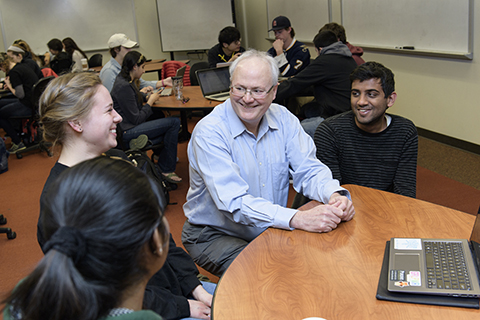April 20, 2016
Murphy Award: Larry Nies
 |
|
Larry Nies, professor of civil engineering and environmental and ecological engineering. (Purdue University photo/John Underwood) |
Five exceptional teachers have been selected as recipients of the 2016 Outstanding Undergraduate Teaching Award in Memory of Charles B. Murphy. This Q&A focuses on Larry Nies, professor of civil engineering and environmental and ecological engineering.
Years at Purdue: 23.
Teaching interests: Microbial processes and how they dominate global biogeochemistry; developing students’ critical thinking skills in the context of sustainable engineering.
Teaching goals: I want students to practice thinking about complex, multidimensional problems for which there are not single correct solutions. I also want students to look back at their courses, especially ones they took with me, and know that what they learned and experienced was valuable.
What Nies enjoys most about teaching: First and foremost, I enjoy the students and how enthusiastic and curious they can be. I try to teach students that the purpose of engineering is to improve the human condition. The practice of engineering requires development of technology within the context of cultural, moral and political perspectives and must be enacted within economic constraints. I ask my students to be introspective and reflect on their own cultural perspectives and experiences and frame them within the diversity of global perspectives. Engineering is for people and about people. Students need to advance their ability to connect with humanity, and a good learning activity for this is self-reflection. What I really enjoy more than anything about the experience of being a teacher is when I receive mail from former students telling me that some aspect of my sustainability class is meaningful and important in their job.
On IMPACT, distance education classes and learning communities improving teaching: Teaching is an art, a skill and a discipline. With practice, work and learning we can become better teachers. Purdue provides to us many opportunities that can stretch us in new dimensions. The opportunities also expose us to our community of fellow teachers from whom we can learn so much. We have many outstanding teachers at Purdue and I am so grateful to have learned many things from these talented colleagues. In my sustainable engineering course I launched in 2002, I aspired to deepen students’ learning beyond just technical thinking. I was fortunate to be accepted into the second cohort of the IMPACT program and began delivering a redesigned course in Fall 2011. Every single day of the course was evaluated, modified, assessed and improved. The course is delivered with a different approach in a space that enables peer-to-peer interaction. The content has been realigned with new learning objectives. Instructional strategies have been transformed to include small group discussions, multimedia, feedback software and many more minutes of active learning.
Why Nies believes that not all classrooms should be set up as a lecture hall: The best learning is collaborative, cooperative and problem-based. A learning space that can facilitate these activities is key. More than affecting students' ability to learn, we influence how they learn. Every student at Purdue has the ability. A great learning space and a well-designed course can allow more of student's ability to flourish. The IMPACT program provided a physical space that allowed for the transformation of a 100-student lecture format into 20 teams divided into tables of 5 students. The results have been active engagement in group discussion, inter- and intra-team collaboration, creation of novel sustainability plans, and a unique instructional design for an engineering course.
Writer: Aspen Deno, denoa@purdue.edu

